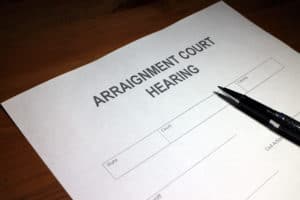If you are arrested under suspicion of having committed a crime, then first step is the arraignment. It is the first change you will have to appear in court and state your plea. You can – and should – have a criminal defense attorney at your side during your arraignment. Keep reading to learn what to expect at your arraignment and then contact Chambers Law Firm at 714-760-4088 for a free legal consultation.
The Timeline for Arraignment in California
The police’s job is to arrest you and the DA’s job is to decide what charges they should file. You may be arres6ted for one crime and eventually charged with a different crime = or additional crimes. California law requires that anyone who is arrested and held in custody must be arraigned within 48 hours (this does not include weekends or holidays).
In the event you are not in custody, the arraignment timeline is very different if you are charged with a felony or a misdemeanor. A misdemeanor crime will generally not lead to arraignment for at least ten days after arrest. That gives you plenty of time to hire a criminal defense attorney who can handle your case for you. In the case of a felony in which a person is not held in jail awaiting arraignment, it can take weeks or even months for arraignment.
You Will Be Given Important Information at the Arraignment
You can expect to receive important information at the arraignment. This will generally include the charges you are facing, your rights via the state and federal constitutions, and the fact that you have a right to an attorney.
You Will Enter a Plea at Your Arraignment
The arraignment is when you will first say how you plead to the charges. The options are guilty, not guilty, or no contest. As the name implies, not guilty means that you are saying all charges against you are false. Guilty means you committed the crime. No contest means that you do not deny the charges against you but you are also not going to fight them or admit guilt.
The obvious disadvantage of this option is that you will have a criminal conviction on your record. The main advantage is that you are not admitting guilty. This means that if you are also being sued in civil court, you are not admitting fault and it cannot be used against you. This is a way of ending a case and wrapping it up, rather than dealing with a lengthy trial.
You Need an Attorney at Your Arraignment
Are you required by law to have an attorney at your arraignment? No, but we strongly recommend it. An attorney can ensure that you do not say anything that further incriminates you. Even if you are pleading guilty, we can work to negotiate the best possible plea deal. Call Chambers Law Firm at 714-760-4088 now to request your free legal consultation.





